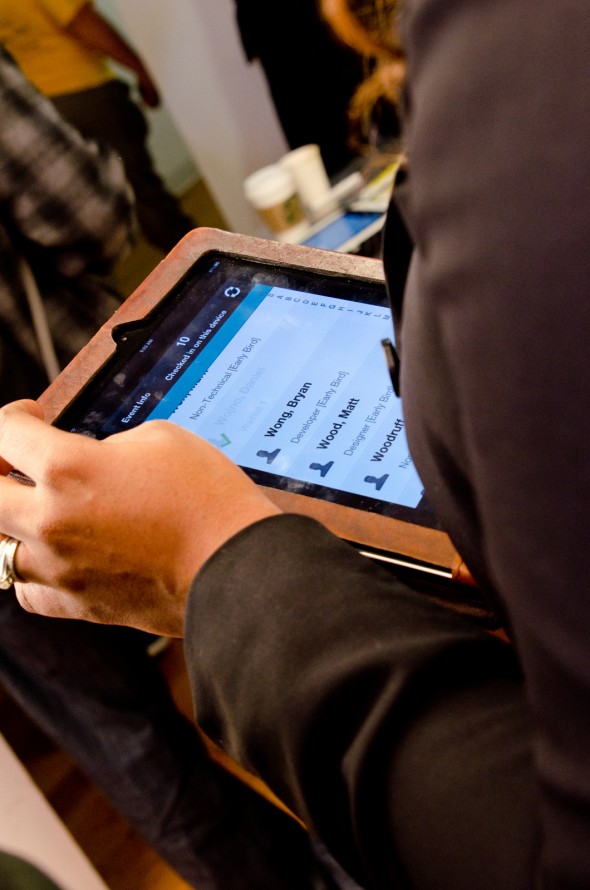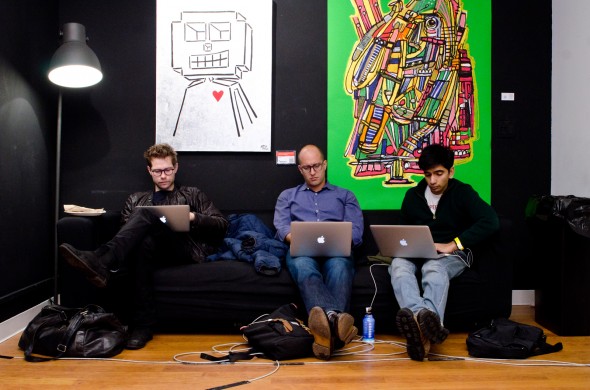
A unique kind of buzz was in the air at New York Fashion Week this year, the undeniable excitement about fashion’s blossoming romance with technology. From live streaming and live tweeting to models Instagram-ing from their smart phones on the runway (thank you, Kenneth Cole), no one can deny the current focus on technology in the world of fashion.
On the last day of Fashion Week, which happened to fall on Valentine’s Day, the first ever fashion and technology event took place in the tents: The Decoded Fashion Forum & Hackathon Finale. With a week’s worth of shows and experiences and ideas to draw from, what perfect timing to finally address this new—and game-changing—coupling.
But who is Decoded Fashion? Founded in 2011 by marketing and PR expert Liz Bacelar, Decoded Fashion serves as a liaison between worlds of tech and fashion. The company introduces startups with emerging technology to key players in fashion and retail through organized events and discussions. Stephanie Winston Wolfkoff, Vogue’s former special events director and the virtual ringmaster of Fashion Week, is Decoded Fashion’s co-executive producer.
The premiere of Fashion Hackathon was introduced by Decoded Fashion a few days prior to the start of Fashion Week, along with Condé Nast, at the hip shared workspace Alley NYC. A challenge was proposed to a sold-out group of diverse—and quite well-dressed—developers and technologists: create an app that supports the overall growth of American fashion as a global industry as outlined by the mission of the Council of Fashion Designers of America (CFDA). And do it in 24 hours. Ready…go!
A panel discussion kicked off the festivities in order to ensure the developers were prepared to meaningfully address the needs of the fashion industry. Among the speakers was Uri Minkoff, founder and CEO of Rebecca Minkoff, who proposed that brands could use evidence of consumer desire—via social media analysis—to influence wholesale buying decisions if the right tools existed. Also on deck was The Design Gym, an organization designed to teach problem solving via design thinking methodologies, to support the programmers in their brainstorming processes. Also, partner companies offered a variety of APIs providing functionalities like location (Foursquare), photo-editing tools (Aviary) and e-commerce click-through (Skimlinks).
Part conference, part competition, the Decoded Fashion Hackathon was a groundbreaking creative think tank of sorts, exploring possible future directions in which the fashion industry might go, while taking the actual first steps toward blazing those trails. After working through the night, more than 550 people churned out 78 apps.

Two weeks later, five semi-finalists took the stage at the Decoded Fashion Forum & Hackathon Finale to pitch to the panel of judges that included Zac Posen, Steven Kolb, CEO of CFDA, Susan Lyne, chairman at Gilt Groupe, Dirk Standen, editor-in-chief at Style.com, and Uri Minkoff of Rebecca Minkoff. Three finalists were chosen:
1. 42: Aims to improve brick-and-mortar experience for customers and provide data on consumer experience for retailers by tracking “potential sales” based on interest. Measures and personalizes the in-store experience by allowing customers to scan bar codes. This information is stored and the retailer can choose to send the customer emails about when those items go on sale. Through Foursquare, the app shows where shoppers are from and what they are sharing about the store based on a “consumer sentiment” algorithm. Designed by: Cathy Han, Nicholas Porter, Lucas Lemanowicz, and Sarah Hum.
2. Coveted: Perhaps the simplest of the apps, Coveted is a one-click checkout platform for brands on Tumblr. Users can sell their products on Tumblr simply by posting a photo of their item. Designed by: Michael Dizon, Ian Culley, and Jason Fertel.
3. SWATCHit: Allows designers to upload swatches they would like to have sampled and submit specs and time frames for completion. They have a database of artisans in India and other emerging markets to connect with, and there is even a non-disclosure agreement built in to protect intellectual property. Artisans can respond, upload their own images or share their own designs. Designed by: Hendrika Makilya, Jag Gill, Jackson Lin, and Paul Yun.
In the end, SWATCHit walked away with the top prize of $10,000 and CFDA backing. While all the apps are prize-worthy, the benefits of SWATCHit are larger-scale and include new sources of supply, lower cost for designers, and a huge impact socially and economically. But Candy Pratts Price, contributing editor of Vogue.com and pitch moderator, declared all the pitch teams winners, since “the spotlight is opportunity.”
The Decoded Fashion Hackathon marks a huge step toward bringing meaningful technological innovation to an industry that could really use it. As Bacelar explains on NPR, “The interesting thing about fashion is [the companies] are trendsetters, right? But right now the industry could really use some innovation. They have kind of lagged behind in technology and how to run a business in a lean way using the power of tech. So we came up with the idea of leveraging technology in a very quick way, to pitch them ideas for them to consider trying.”
Decoded Fashion may have been the first to get the ball rolling, but this is only the beginning of a major movement. All eyes are on fashion and technology right now. “Everyone is looking for the next best answer in closing the loophole between fashion and technology,” says Wolkoff, who co-founded the forum with Bacelar, “To anchor Fashion Week with an event that brings together all these talented people from different worlds is critical to the industry. This is the wave of the future.” For more information, visit decodedfashion.com.
Text by Michelle Oznowicz

